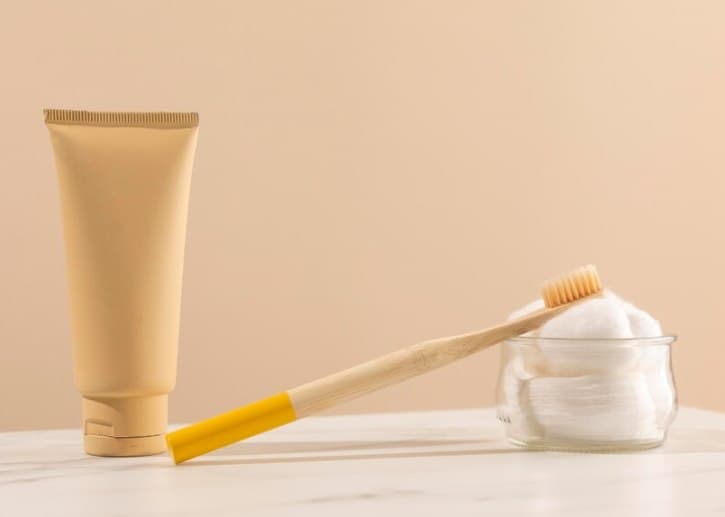Xylitol, a natural sugar alcohol found in many fruits and vegetables, offers numerous benefits when included in toothpaste. Its ability to reduce plaque and inhibit harmful bacteria makes it a powerful ally in oral health. Saliva production is crucial for maintaining the mouth’s pH balance and mineral levels, and xylitol promotes this process effectively.
This natural sweetener not only helps in preventing cavities but also supports overall dental hygiene. Regular use of xylitol-containing toothpaste can lead to healthier teeth and gums, making it an excellent choice for daily oral care routines.
What is Xylitol?
Xylitol is a natural sweetener. It looks and tastes like sugar. Xylitol has fewer calories than sugar. It does not cause a spike in blood sugar levels. Many people use it as a sugar substitute.
Xylitol is often used in toothpaste. It helps reduce the growth of harmful bacteria in the mouth. This can prevent cavities and tooth decay. Xylitol also helps to keep the mouth moist. This is good for people with dry mouth. Toothpaste with xylitol can make teeth stronger and healthier.
Read Also: Shocking Truth About Electric Toothbrush Side Effects
How Xylitol Works
Xylitol is a natural sugar alcohol. It looks and tastes like sugar. It does not raise blood sugar levels. It helps prevent cavities. Xylitol cannot be broken down by bacteria. This stops bacteria from growing and producing acid. Acid is what causes tooth decay.
Xylitol reduces the number of harmful bacteria in the mouth. It also increases saliva production. Saliva helps to neutralize acids. This protects teeth from decay. Xylitol also helps to repair damaged enamel. Strong enamel is important for healthy teeth.
Preventing Tooth Decay
Xylitol helps reduce cavities. It stops bacteria from making acids that harm teeth. Less acid means fewer cavities. Xylitol also keeps teeth clean. This makes it hard for bacteria to stick to teeth.
Xylitol helps strengthen enamel. Strong enamel protects teeth from damage. This makes teeth healthier. Xylitol also helps teeth absorb calcium. Calcium is important for strong teeth.
Gum Health Benefits
Xylitol can help reduce gingivitis. It works by decreasing harmful bacteria in the mouth. Harmful bacteria cause gum inflammation. Reducing these bacteria helps prevent gum disease. Regular use of xylitol toothpaste can improve gum health. Healthy gums are less likely to bleed. This makes brushing and flossing easier.
Using xylitol toothpaste promotes healthy gums. Xylitol increases saliva production. Saliva helps wash away food particles and bacteria. This keeps the gums clean and healthy. Healthy gums support strong teeth. They also help prevent tooth loss. Good gum health is important for overall oral hygiene.
Freshening Breath
Xylitol helps to neutralize odors in your mouth. It can reduce the smell of bad breath. Bacteria in the mouth produce bad smells. Xylitol stops these bacteria from growing. This makes your mouth smell better. It is a simple way to keep your breath fresh.
Toothpaste with xylitol gives long-lasting freshness. The fresh feeling lasts for hours. Xylitol keeps your mouth fresh and clean. It works even after brushing. Using xylitol toothpaste every day helps keep your breath fresh all day.
Safety And Side Effects
Xylitol is safe for humans to use. It does not cause harm when used in toothpaste. Many studies show xylitol is non-toxic. People of all ages can use it safely.
Even children can use toothpaste with xylitol. The body handles xylitol well. It does not cause allergies. Xylitol does not harm teeth. It helps to fight tooth decay. This makes it a great choice for toothpaste.
Most people do not have problems with xylitol. Some might feel mild stomach upset. This can happen if too much is used. It is rare but possible. Drinking water can help ease this.
Xylitol is safe in small amounts. Use the recommended amount in toothpaste. Always read the label. Follow the directions carefully. If unsure, ask a dentist. They can give good advice.
Comparison With Traditional Toothpaste Ingredients
Xylitol in toothpaste helps reduce cavities and strengthens enamel. Traditional toothpaste ingredients often lack these benefits. Enjoy fresher breath and better oral health with xylitol.
Xylitol Vs. Fluoride
Xylitol helps stop bacteria from sticking to teeth. Fluoride makes teeth strong and fights cavities. Both are good for teeth, but they work in different ways.
Xylitol is natural and found in many fruits. Fluoride is a chemical added to many toothpastes. Xylitol can also help make your mouth feel fresh. Fluoride is known for making teeth hard. Some people prefer natural things like xylitol.
Natural Alternatives
Natural alternatives to fluoride include xylitol, baking soda, and coconut oil. Xylitol is sweet but does not cause cavities. Baking soda helps clean teeth and whiten them. Coconut oil can help remove harmful bacteria. These natural options can be part of a healthy routine. Many people like natural choices for their teeth. They feel safer with fewer chemicals.
Conclusion
Xylitol in toothpaste offers numerous benefits for your dental health. It helps prevent cavities, reduces plaque, and fights bacteria. Using xylitol toothpaste can improve overall oral hygiene.
Make the change right now for a happier, healthier grin. Never forget that even a tiny adjustment to your toothpaste can have a big impact on your oral health.
